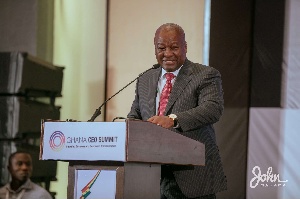- Home - News
- Elections 2024
- News Archive
- Crime & Punishment
- Politics
- Regional
- Editorial
- Health
- Ghanaians Abroad
- Tabloid
- Africa
- Religion
- Photo Archives
- Press Release
Politics of Monday, 26 May 2025
Source: www.ghanawebbers.com
Ghana CEO Summit: Mahama unveils eight-pillar economic reset plan
President John Dramani Mahama has introduced an eight-pillar strategy to boost Ghana’s economy. This plan emphasizes fiscal discipline, market confidence, and strategic investments. The goal is to restore economic stability and promote long-term growth.
Mahama spoke at the Ghana CEO Summit in Accra on May 26. He outlined the strategy as follows:
1. Completing the IMF Programme with Discipline
Mahama stressed the need for strict fiscal discipline in spending and borrowing. He aims for Ghana to finish the fourth review of the IMF programme by June 2025. An exit strategy is expected by 2026, followed by policy support for responsible financial practices.
2. Reopening Domestic and International Capital Markets
Plans are underway to reopen Ghana’s bond markets with help from the IMF, local banks, and the Ghana Stock Exchange. Future borrowing will be tied to self-financing projects by government agencies.
3. Strengthening Sovereign Funds and Local Government Financing
The government will amend regulations for mandatory contributions to sinking and stabilization funds. This aims to ensure financial security for future needs. Mahama also wants municipalities to issue infrastructure bonds for local development projects.
4. Clearing Verified Arrears and Rationalising Public Investments
A comprehensive audit of government arrears is currently in progress. Plans are in place to clear legitimate debts transparently. New projects will be prioritized based on necessity, funding availability, and national interests.
5. Accelerating Public Financial Management Reforms
To improve financial efficiency, reforms like the Treasury Single Account (TSA) will be reactivated. Integrated tax administration and real-time budgeting tools will also be implemented to reduce waste and corruption.
6. Revitalising Exports Through Ghana Exim Bank
The Ghana Exim Bank will focus on boosting non-traditional exports, agro-processing, light manufacturing, and SMEs. This initiative aims to enhance foreign exchange reserves while creating jobs.
7. Building Ghana into a Regional Hub for Trade and Investment
Ghana seeks to become West Africa’s leading hub for trade, transport, and digital services. Key sectors such as port expansion, healthcare, education, and industrial corridors will be strengthened.
8. Resuming Infrastructure Development to Stimulate Growth
Mahama highlighted that infrastructure investments are crucial for economic growth. His administration plans to prioritize roads, energy, water supply, housing, and urban renewal through innovative financing models like public-private partnerships (PPPs).
This strategy aims to set a solid foundation for Ghana's economic future.











